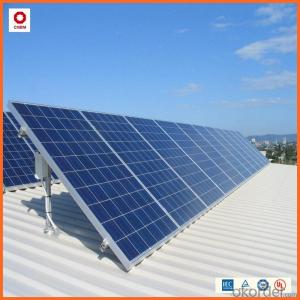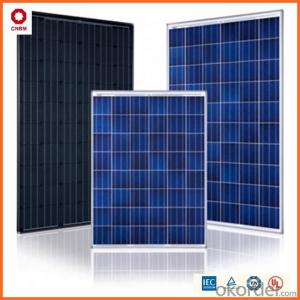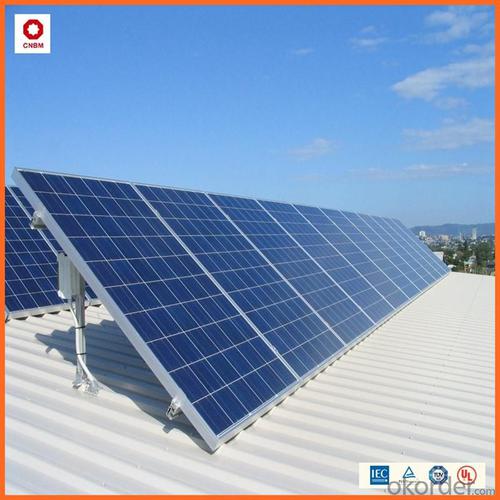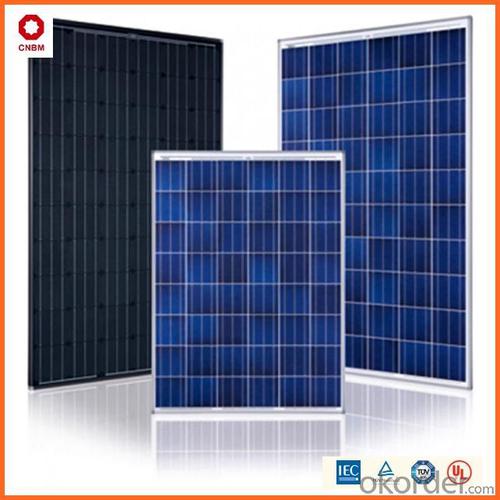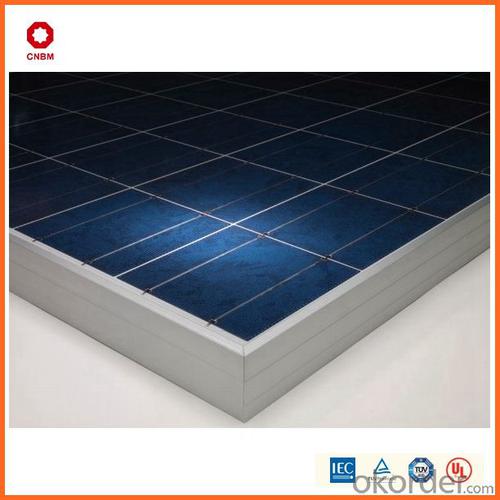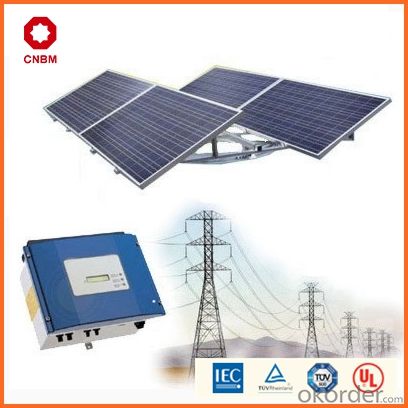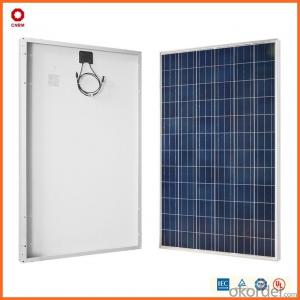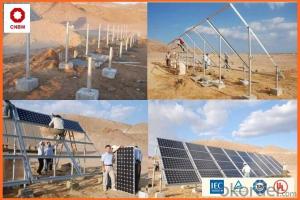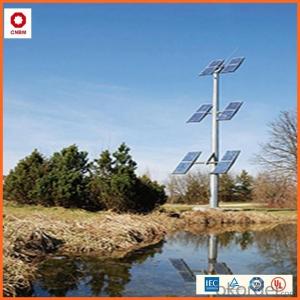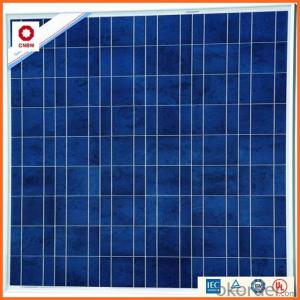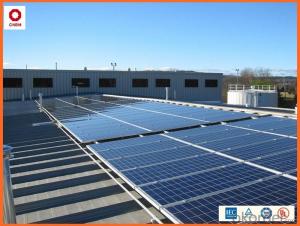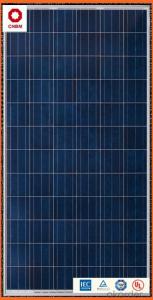15w Small Solar Panels in Stock China Manufacturer
- Loading Port:
- China main port
- Payment Terms:
- TT OR LC
- Min Order Qty:
- 10 watt
- Supply Capability:
- 10000000 watt/month
OKorder Service Pledge
OKorder Financial Service
You Might Also Like
Specification
Product Description:
Hot Sale !!! Quality and Safety of Small Poly Solar Panel 5w~150w
1. Rigorous quality control meets the highest international standards.
2. High-transmissivity low-iron tempered glass, strong aluminium frame.
3. Using UV-resistant silicon.
4. IS09001/14001/CE/TUV/UL
Warranties of Small Poly Solar Panel 35~85w
1. 10 years limited product warranty
2. 15 years at 90% of the minimal rated power output
3. 25 years at 80% of the minimal rated power output
Specification
Characteristics of Poly solar panels CNBM (245-320W) | |||||
Max Power Voltage Vmp(V) | 30.3 | 30.8 | 31.1 | 31.4 | 31.85 |
Max Power Current Imp(A) | 7.60 | 7.64 | 7.73 | 7.81 | 7.85 |
Open Circuit Voltage Voc(V) | 36.1 | 36.6 | 37 | 37.3 | 37.68 |
Short Circuit Current Isc(A) | 8.50 | 8.55 | 8.65 | 8.75 | 8.85 |
Max Power Pm(W) | 230W | 235W | 240W | 245W | 250W |
Temperature Coefficient of Cells Poly solar panels CNBM (245-320W) | |
NOCT | 45± 2 |
Temperature Coeffucients of Isc | 0.0492 |
Temperature Coeffucients of Voc | -0.3374 |
Temperature Coeffucients of Voc | -0.4677 |
Mechanical Data of Poly solar panels CNBM (245-320W) | |
Dimension | 1638 × 982 × 40 mm |
Weight | 19.5 kg |
No. of Cells and Connections | 60 (6 ×10) |
Tolerance | 0 ~ + 5 W |
Cell | Monocrystalline Cell 156 × 156 mm |
Packing | 624 Pcs/40ft(H) Container |
Limits of Poly solar panels CNBM (245-320W) | |
Operating Temperature | -40 to +85 |
Storage Temperature | -40 to +85 |
Max System Voltage | 1000VDC(IEC) / 600VDC(UL) |
Features of our products:
• High conversion efficiency mono/poly-crystalline amorphous silicon solar cells
• Modules incorporate high performance bypass diodes to minimize the power drop caused by shading
• High transmittance, low-iron tempered glass
• High performance EVA encapsulant to prevent destroying and water.
• AI frame: without screw, corner connection. 8 holes on the frame can be installed easily
• Good performance of preventing from atrocious weather such as wind and hails
• Certifications: CE IEC TUV VDE UL, Class I
• 10 years 90% power output warranty

Shipping of Small Poly Solar Panel 35~85w
By Sea | Delivery from Shanghai or Ningbo seaport |
By Air | Departure from Shanghai Pudong Airport |
By Express | Post by DHL, EMS, UPS, TNT. |
Features of our products:
• High conversion efficiency mono/poly-crystalline amorphous silicon solar cells
• Modules incorporate high performance bypass diodes to minimize the power drop caused by shading
• High transmittance, low-iron tempered glass
• High performance EVA encapsulant to prevent destroying and water.
• AI frame: without screw, corner connection. 8 holes on the frame can be installed easily
• Good performance of preventing from atrocious weather such as wind and hails
• Certifications: CE IEC TUV VDE UL, Class I
• 10 years 90% power output warranty
As a professional Solar Panel manufacturer and Supplier in China, we have our customers come around the whole world and our specialization has got a worldwide recognition. Meanwhile, with our superior quality, competitive price, prompt and excellent service, As main role in trade section of CNBM Group, CNBM International Corporation supplies products including Monocrystalline Solar Panel, Polycrystalline Solar Panel ( multicrystalline silicon Solar Panel) have received and enjoyed famous reputation in many countries and regions in the world.
- Q: Can a solar energy system be used in areas prone to hurricanes or tornadoes?
- Solar energy systems can indeed be utilized in regions that are susceptible to hurricanes or tornadoes. Although these natural calamities can potentially inflict harm on solar panels and other system components, employing appropriate preparation and installation methods can alleviate these risks. The design and structural integrity of solar panels themselves are crucial considerations. High-quality panels are constructed to withstand powerful winds and extreme weather conditions. They undergo rigorous testing and certification processes to meet specific standards, including wind resistance ratings. In hurricane or tornado-prone areas, it is essential to install panels explicitly engineered to endure the potential wind speeds and impacts associated with these events. Furthermore, employing proper installation techniques can enhance the resilience of a solar energy system. For instance, utilizing reinforced mounting structures, securing panels with additional brackets or fasteners, and ensuring secure connections between panels, inverters, and batteries can prevent damage caused by strong winds or airborne debris. In certain cases, homeowners may opt to invest in solar panel tracking systems that automatically adjust panel positions to minimize wind resistance during severe weather occurrences. This feature protects the panels and increases their likelihood of surviving hurricanes or tornadoes with minimal damage. Moreover, having a backup power storage system, such as batteries, is essential to ensure uninterrupted power supply during and after severe weather events. This backup system stores excess energy generated by the solar panels, enabling the system to function independently of the grid during power outages caused by hurricanes or tornadoes. Overall, although there are risks associated with utilizing a solar energy system in hurricane or tornado-prone areas, careful planning, proper installation, and the use of resilient components allow for the harnessing of solar power even in these challenging environments.
- Q: Can solar energy systems be used for emergency backup power during power outages?
- Yes, solar energy systems can be used for emergency backup power during power outages. Solar panels generate electricity from sunlight, which can be stored in batteries for later use. This stored energy can then be used to power essential devices or appliances during an outage, providing a reliable source of backup power.
- Q: How long does it take to recoup the cost of installing a solar energy system?
- The length of time it takes to recoup the cost of installing a solar energy system can vary depending on various factors, including the initial cost of the system, the amount of electricity the system generates, and the cost of electricity from the grid. On average, it typically takes around 5 to 10 years to recoup the upfront investment of a solar energy system. However, this time frame can be shorter or longer depending on the specific circumstances. One of the key factors influencing the payback period is the cost of electricity from the grid. If electricity prices are high, the solar system can offset a larger portion of the electricity bill, leading to quicker payback. Additionally, the availability of government incentives and tax credits can significantly reduce the initial cost and shorten the payback period. The amount of electricity generated by the solar system also plays a crucial role. A larger system that generates more electricity will offset a greater portion of the electricity bill, accelerating the payback period. Another consideration is the location and local climate. Regions with ample sunlight and higher electricity costs tend to have shorter payback periods. Additionally, the presence of net metering programs, where excess energy generated by the system can be sold back to the grid, can further shorten the time it takes to recoup the investment. It's important to note that while the payback period is an important aspect of evaluating the financial feasibility of a solar energy system, it is just one factor to consider. Solar energy systems have long lifespans, typically around 25 to 30 years, during which they can continue to generate free and clean electricity, providing significant savings and environmental benefits beyond the payback period.
- Q: What is a solar inverter and what does it do?
- The solar inverter is a crucial element in a solar power system, responsible for transforming the direct current (DC) electricity produced by solar panels into alternating current (AC) electricity, which is the type commonly used in households and businesses. When sunlight strikes the photovoltaic cells, solar panels generate DC electricity by creating an electrical charge. However, AC electricity is the primary power source for most household appliances and the power grid. Consequently, a solar inverter is necessary to convert the DC power from the solar panels into AC power suitable for operating household appliances or feeding back into the grid. In addition to converting electricity, solar inverters fulfill other vital tasks. They regulate voltage and current levels to ensure the produced electricity is safe and compatible with electrical devices. Furthermore, solar inverters incorporate a mechanism known as Maximum Power Point Tracking (MPPT) to optimize the energy output of the solar panels. MPPT adjusts the operating voltage and current of the solar panels to extract the maximum power, even in various weather and shading conditions. Moreover, solar inverters possess built-in safety features to safeguard the system and the electrical grid. They continually monitor the flow of electricity and promptly shut down the system in case of faults, such as short circuits or grid outages, to prevent any potential damage or injuries. In summary, the solar inverter plays an indispensable role in a solar power system, converting the DC electricity generated by solar panels into AC electricity necessary for powering homes, businesses, and the electrical grid. Moreover, it guarantees the secure and efficient operation of the system through voltage and current regulation, energy output optimization, and protection against faults.
- Q: Can solar energy systems be used in powering airports or transportation hubs?
- Solar energy systems have the capability to power airports and transportation hubs. By installing solar panels, we can harness renewable and sustainable energy from the sun. These panels can be positioned on airport buildings' roofs, parking lots, or the surrounding ground. The utilization of solar energy in airports and transportation hubs is multifaceted. It can generate electricity to power lighting systems, security cameras, and other electrical equipment within the airport premises. Solar power can also be used to charge electric vehicles like electric buses or airport shuttles. This promotes a cleaner transportation system and reduces carbon emissions. In addition, solar energy systems serve as a reliable backup power source during emergencies or power outages. This is particularly crucial for airports, as continuous operations and safety measures must be maintained. Recently, various airports worldwide have adopted solar energy to decrease their carbon footprint and operating expenses. For example, Cochin International Airport in India achieved the distinction of being the world's first completely solar-powered airport in 2015. It generates surplus electricity that can be returned to the grid. Overall, integrating solar energy systems into airports and transportation hubs is both environmentally friendly and economically advantageous in the long term. It diminishes reliance on fossil fuels, reduces energy costs, and contributes to a more sustainable and greener transportation infrastructure.
- Q: Are there any maintenance costs associated with solar energy systems?
- Solar energy systems come with maintenance costs. Although solar panels require minimal maintenance compared to other energy systems, there are still expenses involved. These include regularly cleaning the panels for optimal efficiency, inspecting and repairing any damaged or malfunctioning components, and occasionally replacing worn-out parts. Moreover, monitoring and maintaining batteries or inverters that store and convert energy may be necessary. It is also advisable to have a professional conduct an annual inspection to ensure proper functioning. While these maintenance costs are generally low compared to the savings generated from solar energy, it is essential to consider them when analyzing the overall installation cost.
- Q: Can solar energy systems be used in cold storage facilities?
- Yes, solar energy systems can be used in cold storage facilities. Solar panels can generate electricity to power the refrigeration systems required for cold storage. However, it is important to design the system with proper insulation and backup power options to ensure continuous operation during periods of low sunlight or high energy demand.
- Q: Can solar energy systems power an entire home or business?
- Yes, solar energy systems have the potential to power an entire home or business. The size and efficiency of the system, as well as the energy requirements of the property, play a crucial role in determining if it can meet all the energy needs. With the right design and installation, solar energy systems can provide enough electricity for the entire building, while also reducing reliance on traditional energy sources and lowering carbon emissions.
- Q: Can solar energy systems be used in areas with limited access to replacement parts?
- Yes, solar energy systems can be used in areas with limited access to replacement parts. Solar panels have a long lifespan and require minimal maintenance. Furthermore, solar energy systems are designed to be durable and reliable, making them suitable for remote locations with limited resources. In such areas, it is possible to set up self-sustaining solar power systems that operate efficiently for years without requiring frequent replacements or spare parts.
- Q: Can solar energy systems be used off-grid?
- Yes, solar energy systems can be used off-grid. Off-grid solar systems are designed to generate and store electricity independently, without the need for connection to the traditional power grid. These systems consist of solar panels, batteries for energy storage, and inverters to convert the DC electricity produced by the panels into usable AC electricity. Off-grid solar systems are particularly useful in remote areas where grid connection is not available or economically viable.
Send your message to us
15w Small Solar Panels in Stock China Manufacturer
- Loading Port:
- China main port
- Payment Terms:
- TT OR LC
- Min Order Qty:
- 10 watt
- Supply Capability:
- 10000000 watt/month
OKorder Service Pledge
OKorder Financial Service
Similar products
Hot products
Hot Searches
Related keywords
